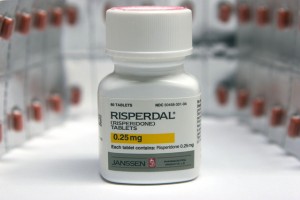Lawyer Spars With FDA Over J&J Risperdal Court Documents
by Ed Silverman, Pharmalot
 In an unusual tactic, an attorney is prodding the FDA to seek documents that purportedly detail side effects caused by the Risperdal antipsychotic, but cannot be released publicly due to a court order. The documents were sealed by a Philadelphia judge as part of ongoing litigation over claims the Johnson & Johnson drug causes gynecomastia, which is the abnormal development of breasts in males.
In an unusual tactic, an attorney is prodding the FDA to seek documents that purportedly detail side effects caused by the Risperdal antipsychotic, but cannot be released publicly due to a court order. The documents were sealed by a Philadelphia judge as part of ongoing litigation over claims the Johnson & Johnson drug causes gynecomastia, which is the abnormal development of breasts in males.
For the past year, Stephen Sheller has attempted to convince the FDA that the documents should be disclosed and, initially, filed a Citizen’s Petition, which also asks the agency to require a so-called Black Box warning to reflect what he has termed a lack of safety data. An FDA spokeswoman tells us the agency is “actively reviewing” the petition, but declined to comment further.
At issue is a deposition by former FDA commissioner David Kessler, who last fall submitted a 92-page report submitted as part of the litigation and slammed J&J for allegedly promoting Risperdal for unapproved uses. His report also refers to other documentation that is under protective order, according to Sheller.
“The FDA doesn’t know what to look for” says Sheller, referring to J&J Risperdal safety documents.
 In a recent letter to the FDA, Sheller refers to Kessler’s review of a 2003 study in the Journal of Clinical Psychiatry. Funded by a J&J unit, the meta-analysis determined that long-term Risperdal treatment in children did not demonstrate a correlation between elevated prolactin levels and gynecomastia in boys. Several co-authors were also J&J employees.
In a recent letter to the FDA, Sheller refers to Kessler’s review of a 2003 study in the Journal of Clinical Psychiatry. Funded by a J&J unit, the meta-analysis determined that long-term Risperdal treatment in children did not demonstrate a correlation between elevated prolactin levels and gynecomastia in boys. Several co-authors were also J&J employees.
In the report, Kessler maintains that J&J failed to present the data in an “objective fashion.” As an example, he alleged that J&J altered the results by ignoring all (adverse) events reported in boys 10 years or older and, in his opinion, misled physicians and the scientific community. According to Sheller, Kessler went into greater detail in his deposition.
“Dr. Kessler was recently deposed on the subjects of his expert report, including his criticism of the meta-analysis. Although confidential, the FDA has no bar or impediment in its way and can simply ask J&J for a copy of the transcript to review,” Sheller wrote to the agency earlier this month. “…The FDA will find value in Dr. Kessler’s analysis, along with a review of the corroborating documents.”
Risperdal, you may recall, has been an especially controversial drug for J&J. The health care giant has been repeatedly probed and sued over its marketing tactics, and is negotiating a possible $2.2 billion settlement with the US Department of Justice that may include a misdemeanor charge. J&J has also lost battles in several states, including Texas, Arkansas and South Carolina.
Sheller, however, believes this may not be enough, if only because the agency may not be familiar with the documents filed in court, especially those under a protective order, such as the Kessler deposition. Without access to the various materials, he suggests the FDA may not know what to search or how to completely interpret what J&J has so far provided.
For its part, J&J maintains “extensive clinical data” has been given to the FDA about pediatric use. “The information includes internal reports of open-label studies, retrospective surveys, post-marketing reviews, a literature summary, as well as reports from external investigator-initiated studies,” a spokeswoman for the Janssen unit at J&J writes us.
She noted the data was provided in response to an FDA request after Sheller filed his petition in August 2012. “Janssen submitted a formal response to this request and confirmed that we have provided all of the available data requested concerning these products. We continue to adhere to FDA guidelines and regulations. All required clinical information on the pediatric use of these medicines will continue to be shared with the agency, as required by federal law and requested by the agency,” she concluded.
Sheller, however, believes this may not be enough, if only because the agency may not be familiar with the documents filed in court, especially those under a protective order, such as the Kessler deposition. Without access to the various materials, he suggests the FDA may not know what to search or how to completely interpret what J&J has so far provided.
“The FDA has to request that information from J&J (JNJ) and has the authority to do so,” says Sheller, who has spearheaded the litigation against the health care giant. “Without that information, they are not doing their job. It would be like an ostrich putting its head in the sand, because we’ve told them it’s there. J&J says they provided documents, but it’s a data dump. The FDA doesn’t know what to look for.”
Meanwhile, a recent study in Plastic and Reconstructive Surgery concluded that gynecomastia has a significant negative impact on primarily the psychosocial well-being of affected adolescent patients, specifically in regard to social functioning, mental health, and self-esteem. And the impact was affected by the “graded severity” of the disease.
Link
“Lawyer Spars With FDA Over J&J Risperdal Court Documents” by Ed Silverman, Pharmalot, July 11, 2013





